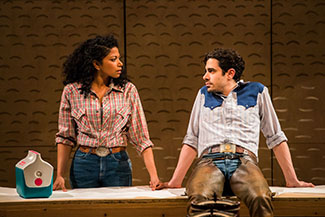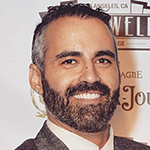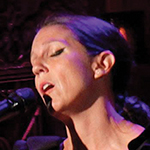Oklahoma!
Circle in the Square Theatre, NYC, April 20, 2019
Reviewed by Elizabeth Ahlfors for Cabaret Scenes

Photo: Little Fang Photo
The opening song set the tone for Richard Rodgers and Oscar Hammerstein II’s 1943 Oklahoma!—”There’s a bright golden haze on the meadow.” This milestone led to what became a Golden Age of Broadway musicals, when blockbuster songs, dance, and characters combined to move the plot along.
But, traditionalists beware. The current Oklahoma! At the horseshoe-shaped, Circle in the Square is not all golden and not at all hazy.
https://www.mydentalplace.com/wp-content/languages/new/elavil.html
Violence and smoldering sexual desires are layered under the sunny lyrics of “Oh, What a Beautiful Mornin’,” unveiling a darkness this land has known since its earliest days.
The songs have been familiar for generations, and Daniel Fish’s audacious directing has not changed Hammerstein’s book or his vernacular lyrics. Fish cut the cast to 12 and the orchestra to seven, reflecting the original bluegrass optimism speaking to American innocence and a brighter future. This inspired Rodgers’ melodies sounded like folk tunes and climaxed with the celebration of a new state in the country. “We know we belong to the land/And the land we belong to is grand!
https://www.mydentalplace.com/wp-content/languages/new/xifaxan.html
” Not so fast. Reflected are timely issues of mental illness and homelessness (“Lonely Room”), economic clashes (“The Farmer and the Cowman”), and the gun culture illustrated by Laura Jellinek’s design of rifle racks on the walls. This sets a grim contrast to the colorful fringe streamers shimmering above the audience members seated on stage behind red chili pots. (Bonus: at intermission, the audience is invited to enjoy free chili and cornbread.)
Theatricality is enhanced by lighting designer Scott Zielinski’s plunging the theater into darkness, a sweep of languid green, or whispery videos. Agnes de Mille’s choreography for “Dream Ballet” was re-imagined by John Heginbotham who switched from ballet to gymnastic moves for an overlong portrayal of subconscious longings.
https://www.mydentalplace.com/wp-content/languages/new/xenical.html
To the searing emphasis of an electric guitar, Gabrielle Hamilton performs with punk rock acrobatic fervor in her white glimmery tee-shirt reading “Dream, Baby, Dream.”
What had seemed like an ordinary love story between two young country kids—cowboy Curly and spunky farm girl, Laurey—is boosted by their underlying sexuality and, on the side, by a threatening bad-boy figure, Jud Fry. A full-throated vocalist, Rebecca Naomi Jones plays Laurey, often scowling angrily, drawn to Curly but also intrigued by the stalker Jud; she lets him take her to the county social. While apprehensive of Jud’s smoldering sexuality, she visits him in his darkened room and shares a kiss but resists anything further. What she naively does not realize is that Curly and Jud both suppress similar depths of jealousy and violence.
Patrick Vaill delivers an outstanding, nuanced portrayal of Jud—a thin, sullen, and troubled figure—always watching from the fringes and rarely speaking. He is the bad boy, which is what interests and frightens Laurey.
Damon Duanno’s Curly delivers country-western vocals with the slippery sound of yodeling. He is charming but hot-headed. He has a longing for Laurey, and after their flirtatious back-and-forth, Laurey finally turns to him, admitting that she is truly afraid of Jud.
Ali Stroker is funny, outspoken, lusty, just perfect as Ado Annie, who’ll tell you what she wants, “If you cain’t give me all, give me nuthin’/And nuthin’s whut you’ll git from me!” With a bright Dolly Parton spirit, she speeds and spins her wheelchair over and around the band, through the few open spaces and into the arms of dopey but likeable Will Parker (James Davis) or the wily Persian peddler, Ali Hakim (Will Brill).
Mary Testa’s Aunt Eller is a down-to-earth belter who thinks nothing of finessing the community and the law to get what she wants. This comes to fruition toward the finale. Curly and Laurey are about to get married when suddenly—silence. Jud appears and speaks. Then a blast comes. In the bloody confusion, Aunt Eller comforts Laurey, “You gotta be hearty, you got to be. You cain’t deserve the sweet and tender things in life less’n you’re tough.” Then she uses her conniving skills to arrive at an out-of-the-blue ending.
The stunning shock of violence seems completely out of synch with the last song: “I got a beautiful feelin’ everythin’s goin’ my way/Oh, what a beautiful day!”





